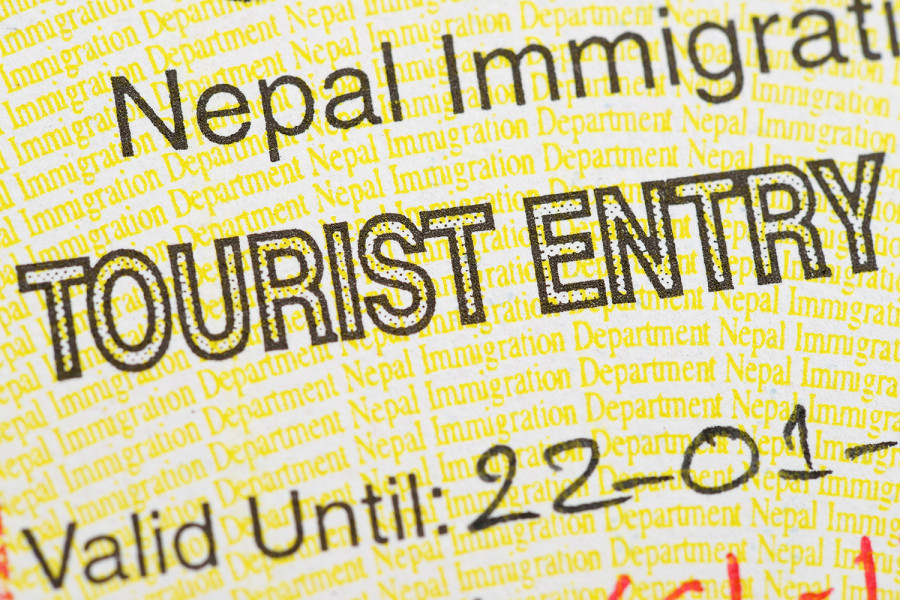Investigations
Using two passports, Michael Kobold evaded Nepali visa regulations
Michael Kobold held two German passports and used them to apply for the same type of visa for Nepal, immigration records show
Pranaya SJB Rana & Tsering D Gurung
German watchmaker Michael Kobold set up dummy companies to apply for business visas and used two German passports to circumvent Nepal’s tourist visa policy, an analysis of his three-year immigration records by The Kathmandu Post shows.
While holding two German passports in itself is not illegal in Germany—the country’s law allows a secondary passport to any citizen who is able to demonstrate a legitimate interest for requiring one—using them to apply for the same type of visa is against the law in Nepal, Nepali immigration officials told the Post.
The Embassy of Germany in Kathmandu, which issued the provisional passport for Kobold, declined to comment citing privacy concerns.
“The German Embassy does not disclose information protected by German data law,” wrote Paula Werner, an embassy representative, in an email. “However, I can assure you, that our embassy carefully examines every passport application and makes sure that every issuance of a passport is lawful.”
Despite setting up his watch company in Nepal in 2012, Kobold conducted much of his business in the country while on a tourist visa, according to immigration records obtained by the Post.
Between December 2015 and December 2018, Kobold applied for and received tourist visa a total of 13 times, six of those were in 2017 when he was actively fundraising for his ‘fire truck expedition’. In his private emails with donors, copies of which were obtained by the Post, Kobold told investors that the project has always been a commercial enterprise and not a charity.
As per Nepal’s immigration policy, a foreigner is allowed to stay in Nepal on a tourist visa for a maximum of 150 days in a year. After that, the individual must leave the country and can visit only the following year.
Kobold, however, used two different passports—a regular German passport and a provisional passport—to sidestep that particular policy, tricking the Department of Immigration into issuing him two separate sets of tourist visa. This allowed him to stay in the country for nearly 200 days.
“Since our system doesn’t use biometrics, it’s impossible for us to detect when an applicant has used two different passports to apply for visas,” said Bishnu Hari Upadhyay, director of information at the Department of Immigration.
Upadhyay said his department is now working towards adopting biometrics to record fingerprints and retinal scans of all visitors at the airport and at border points across the country starting next year.
“We know that a lot of criminals have been using Nepal as a transit point because of its lax screening policies and we want to stop that,” said Upadhyay.
According to Kobold’s immigration records, he used his regular passport to travel to the country between January and April 2017. Once the visa on that passport expired, he then used his provisional passport to obtain a second tourist visa from April to September 2017. When he had used up the quota of stay allowed on a tourist visa on both his passports, he set up a company named Leather Bags Production Company, based in Kathmandu, to apply for a one-month business visa in December 2017.
“He was very desperate to stay in the country,” said Hanna Geschewski, Kobold’s former employee. “He needed to find a new way to stay in Nepal, so he worked with his lawyer to get a business visa.”
According to the Company Registrar Office’s database, no company with the name ‘Leather Bags Production Company’ has been registered in Nepal till date. The possibility of the company being registered with the Department of Cottage and Small Industries is also out of question, said an officer at the registrar’s office as Nepal does not allow foreigners to invest in the sector.
Kobold also used separate emails, many of which do not appear to be real email addresses—[email protected], [email protected], [email protected], [email protected], [email protected]—each time he filled out his visa applications. The applications were all approved and verified by Nepali immigration officials.
In January 2018, instead of applying for an extension of his business visa which can be extended for up to five years, Kobold again chose to apply for a tourist visa.
His former aides said this was because he did not have a legitimate business and thus did not have the required documents to request a renewal of his business visa.
“An individual has to submit a progress report of his company for renewal of visa and he definitely didn’t have any such reports,” said Kobold’s former accountant, Lokendra Kunwar.
Two months later, Kobold applied for a new business visa using a newly registered company called the Great Himalayan Travel Accessories. The company, which was registered in December 2017, has not submitted its audit report to the Registrar’s Office.
Kobold’s oldest company, Kobold Watch Nepal, which is currently under his former employee Rajani Nakarmi’s name, has also not presented its audit report to the Registrar’s Office since 2015.
The company had been fined Rs 46,000 by the Registrar’s Office in March 2015 for its failure to present company details and annual general meeting reports in a timely manner.
“Our main basis for issuing business visas is a recommendation letter from the Department of Industry,” said Bishnu Hari Upadhyay, the information director at the Department of Immigration. “It is not our responsibility to check if a company is properly registered and legally functioning.”
But according to the guidelines on the department’s own website, an applicant for a business visa has to submit “a recommendation letter from the Department of Industry, Foreign Investment acceptance letter, copy of company registration certificate, copy of PAN/VAT certificate, copy of share certificate, copy of industry registration certificate, copy of passport and latest visa, latest tax clearance (regular visa), industry monitoring and supervision report.”
Read: Tourism Board says it will scrap agreement with Michael Kobold if fire trucks don’t arrive by March




 15.87°C Kathmandu
15.87°C Kathmandu











